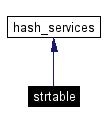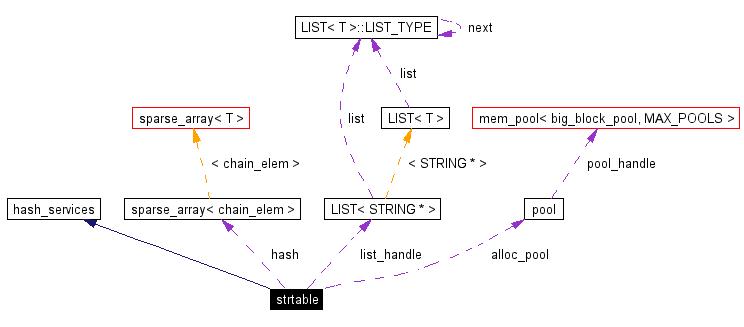
#include <strtable.h>
Inheritance diagram for strtable:


Public Member Functions | |
| strtable (unsigned int size, pool *p) | |
| void | dealloc () |
| ~strtable () | |
| STRING | find_string (STRING item, Boolean insert=TRUE) |
| Search for the string in the string table. | |
| STRING | find_string (const char *str, Boolean insert=TRUE) |
| unsigned int | get_percent_alloced (void) |
| unsigned int | get_max_list (void) |
| void | pr (FILE *fp=stdout) |
| Print the contents of the string table. | |
| STRING | first (void) |
| The functions first and get_item are used to iterate through the string table. | |
| STRING | get_str (void) |
| get_str is used to iterate through the string table. | |
Private Member Functions | |
| STRING * | new_item (STRING str) |
| Allocate a new STRING, plus the associated storage for the string. | |
Private Attributes | |
| unsigned int | table_size |
| unsigned int | hash_slot |
| LIST< STRING * >::handle | list_handle |
| sparse_array< chain_elem > * | hash |
| pool * | alloc_pool |
The string table consists of unique strings, which are null terminated. The strings that are managed by the string table are contained in the STRING class.
This class was originally a generic template (HASH) for building hash tables. However, this template uses other templates (e.g., the sparse_array and LIST templates). C++ compilers (especially the HP C++ compiler) tend to have trouble with nested templates. So this class has been changed to be a specific class, instead of a template.
Definition at line 56 of file strtable.h.
|
||||||||||||
|
Definition at line 96 of file strtable.h. References alloc_pool, sparse_array< chain_elem >::get_total_size(), hash, NULL, and table_size.
00097 {
00098
00099 assert( p != NULL );
00100 alloc_pool = p;
00101 hash = new sparse_array<chain_elem>( (const unsigned int)size );
00102 table_size = hash->get_total_size();
00103 }
|
|
|
Definition at line 110 of file strtable.h. References dealloc().
00111 {
00112 dealloc();
00113 }
|
|
|
Definition at line 104 of file strtable.h. References sparse_array< chain_elem >::dealloc(), and hash. Referenced by ~strtable().
|
|
||||||||||||
|
Definition at line 117 of file strtable.h. References find_string(), and STRING::SetText().
00118 {
00119 STRING local_str;
00120
00121 local_str.SetText( str );
00122 return find_string( local_str, insert );
00123 } // find_item with a char * argument
|
|
||||||||||||
|
Search for the string in the string table.
Definition at line 65 of file strtable.C. References STRING::GetText(), hash, hash_services::hash_value(), sparse_array< chain_elem >::insert(), new_item(), NULL, sparse_array< chain_elem >::probe(), STRING::SetText(), and table_size. Referenced by symtable::enter_sym(), find_string(), symtable::find_sym(), and sym_scope::LookupFromScope().
00066 {
00067 STRING * pVal;
00068 STRING RetStr;
00069 unsigned int ix, val;
00070
00071 val = hash_value( item.GetText() );
00072 // table size should always be a power of 2, so
00073 // table_size - 1 is likely to be a prime.
00074 ix = val % (table_size - 1);
00075 if (! insert) { // insert == FALSE
00076
00077 if (! hash->probe( ix )) {
00078 pVal = NULL;
00079 }
00080 else {
00081 pVal = (*hash)[ ix ].search_list( item );
00082 }
00083 }
00084 else { // insert == TRUE
00085 if (! hash->probe( ix ) ) {
00086
00087 hash->insert( chain_elem(), ix );
00088
00089 pVal = new_item( item );
00090 (*hash)[ix].list.add( pVal );
00091 }
00092 else {
00093 pVal = (*hash)[ix].search_list( item );
00094 if ( pVal == NULL) {
00095 pVal = new_item( item );
00096 (*hash)[ix].list.add( pVal );
00097 }
00098 }
00099 }
00100
00101 if (pVal == NULL) {
00102 RetStr.SetText( NULL );
00103 }
00104 else {
00105 RetStr = *pVal;
00106 }
00107 return RetStr;
00108 } // find_item with a STRING argument
|
|
|
The functions first and get_item are used to iterate through the string table. Note that the strings will be returned in hash order, which is pseudorandom. An example is shown below:
|
|
|
Definition at line 128 of file strtable.h. References hash, sparse_array< chain_elem >::probe(), table_size, and uint.
00129 {
00130 uint i;
00131 uint max, len;
00132
00133 max = 0;
00134 for (i = 0; i < table_size; i++) {
00135 if (hash->probe( i )) {
00136 len = (*hash)[i].list_len();
00137 if (len > max) {
00138 max = len;
00139 }
00140 }
00141 }
00142 return max;
00143 } // get_max_list
|
|
|
Definition at line 126 of file strtable.h. References sparse_array< chain_elem >::get_percent_alloced(), and hash.
00126 { return hash->get_percent_alloced(); }
|
|
|
get_str is used to iterate through the string table. See strtable.h. Definition at line 139 of file strtable.C. References hash, hash_slot, list_handle, NULL, sparse_array< chain_elem >::probe(), STRING::SetText(), and table_size. Referenced by first().
00140 {
00141 STRING local_str;
00142 STRING * pVal;
00143
00144 local_str.SetText( NULL );
00145 pVal = &local_str;
00146
00147 while (list_handle == NULL && hash_slot < table_size) {
00148 if (hash->probe( hash_slot )) {
00149 list_handle = (*hash)[hash_slot].list.first();
00150 }
00151 if (list_handle == NULL) {
00152 hash_slot++;
00153 }
00154 } // for
00155
00156 if (list_handle != NULL && hash_slot < table_size) {
00157
00158 pVal = (*hash)[hash_slot].list.get_item( list_handle );
00159
00160 list_handle = (*hash)[hash_slot].list.next(list_handle);
00161
00162 if (list_handle == NULL)
00163 hash_slot++;
00164 }
00165
00166 return *pVal;
00167 } // get_str
|
|
|
Allocate a new STRING, plus the associated storage for the string.
Definition at line 41 of file strtable.C. References alloc_pool, pool::GetMem(), STRING::GetText(), NULL, STRING::SetText(), and uint. Referenced by find_string().
00042 {
00043 STRING *pStr;
00044 char *pStrCopy;
00045
00046 pStrCopy = NULL;
00047 pStr = (STRING *)alloc_pool->GetMem( sizeof(STRING) );
00048
00049 if (str.GetText() != NULL) {
00050 uint len;
00051
00052 len = strlen( str.GetText());
00053 pStrCopy = (char *)alloc_pool->GetMem( len + 1 /* char for '\0' */ );
00054 strcpy( pStrCopy, str.GetText() );
00055 }
00056
00057 pStr->SetText( pStrCopy );
00058 return pStr;
00059 } // new_item
|
|
|
Print the contents of the string table.
Definition at line 114 of file strtable.C. References hash, LIST< T >::list, NULL, STRING::pr(), sparse_array< chain_elem >::probe(), table_size, and uint.
00115 {
00116 uint i;
00117
00118 for (i = 0; i < table_size; i++) {
00119 if (hash->probe( i )) {
00120 LIST<STRING *>::handle h;
00121 STRING * pVal;
00122
00123 for (h = (*hash)[i].list.first(); h != NULL; h = (*hash)[i].list.next(h)) {
00124 // fprintf(fp, "hash_label::pr: i = %d, ", i );
00125 pVal = (*hash)[i].list.get_item( h );
00126 pVal->pr(fp);
00127 fprintf(fp, "\n");
00128 } // for
00129 } // if
00130 } // for
00131 } // pr
|
|
|
Definition at line 90 of file strtable.h. Referenced by new_item(), and strtable(). |
|
|
Definition at line 89 of file strtable.h. Referenced by dealloc(), find_string(), get_max_list(), get_percent_alloced(), get_str(), pr(), and strtable(). |
|
|
Definition at line 86 of file strtable.h. |
|
|
Definition at line 87 of file strtable.h. |
|
|
Definition at line 85 of file strtable.h. Referenced by find_string(), get_max_list(), get_str(), pr(), and strtable(). |
 1.3.3
1.3.3